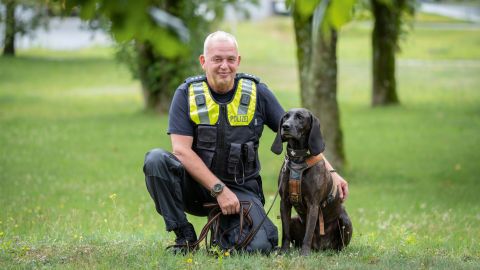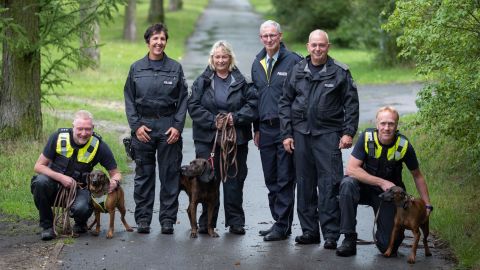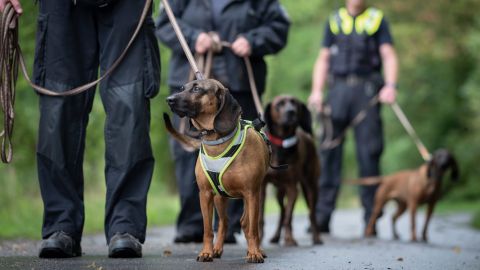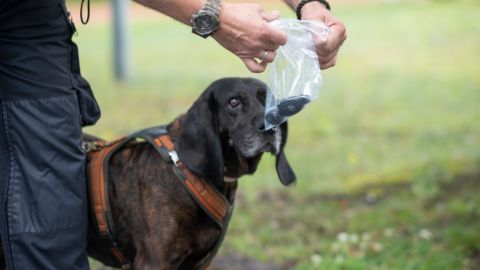Among the civil servants, Wolfgang Fischer from Neuss is the pioneer. He was already involved in the pilot phase when the State Office for Training, Further Education and Personnel Affairs (LAFP) set up the group from 2006 to 2008. The police chief inspector has experienced a lot since then. "I love how the animals can concentrate and find their way."
And yet the search for missing persons or criminals is far from always successful. The interaction between humans and animals is complex and surprises the experienced dog handler time and time again. "There is still a lot of research to be done."
A person's scent is as unique as their fingerprint or DNA. Thousands of skin flakes are shed every minute. The particles swirl around, decompose bacterially and leave an individual trail. A well-trained dog's nose can follow them, even if a plethora of other scents waft around the four-legged friend.
Before the animal sets off, it sniffs an odor carrier that can be assigned to the person it is looking for, such as underwear. "Not every breed is equally suitable for the search," explains Fischer. "Initially, we thought about bloodhounds. But we decided to go for the smaller welding dogs. They are easier to handle," says the 60-year-old Rhinelander. "They're just not always available."
The families of the dog handlers have to share the passion for their work. The job requires full commitment. 24-7 on-call duty. Sometimes a day with a 16-hour deployment. Working closely with the animals at home. You have to want all that, says Wolfgang Fischer. For him and many of his colleagues, the whole thing has lost none of its fascination over the years.
If time is of the essence, a helicopter is sometimes on standby for the teams. Fischer begins to train complicated positions with his Miss Ellie. The eleven-year-old Black Forest sweat bitch amazes with her great scent. "I can't tell her anything else. She'd rather tell me something else," he praises. Of course, the dog is no longer the youngest. "But that's not a big problem. The strain is limited. She's healthy and still wants to. I benefit from her seventh sense." Her nose is the last thing to let older dogs down.
When Miss Ellie gets tired, eight-year-old Wilma takes over. "She can run longer distances effortlessly." Paula is only one year old "and still needs a bit. When she's two or two and a half, she'll be mature enough to start walking." By the time she has developed a routine, Fischer may no longer be on duty. He hopes to be able to retire with his "soul dog" Miss Ellie at some point in the next few years.
Mantrailers mainly search for people with dementia or suicidal people who have suddenly disappeared. But the police also put them on the trail of fugitives who have committed serious crimes, including murder.
Fischer and his 30-kilo partner, for example, managed to help solve a tragic jealousy drama. A young woman had been stabbed to death on her parents' doorstep in Lower Saxony. The ex-boyfriend was suspected of the crime. The dog handler from NRW was called in for the pursuit.
Miss Ellie smelled a stocking belonging to the wanted man and picked up the scent across the small town, which eventually led her to the suspected perpetrator's door in an apartment building. "That closed the chain of evidence. The man was later convicted," reports Fischer.
The routes taken by a dog in the field are recorded electronically in order to document the process. Scent fixation must be practiced under a wide variety of conditions. During training at the LAFP, "runners" are also available whose scent must be recorded.
Trainer Nicole Frings motivates animals and humans again and again. "The exercises with colleagues must never be boring," emphasizes the police chief inspector. "Neither for the police officers nor for the four-legged friends."
The dogs also get treats afterwards if they have done their job well." The 51-year-old trainer constantly reassesses the strengths and weaknesses of the teams. The aim is to optimize each team's performance in the long term. Anyone who can and wants to get involved is accepted. This starts with the puppies. And continues with the selection of officers, who must have previously impressed as service dog handlers in the district police authorities.
"Nobody should be put off by our requirements," reassures Chief Superintendent Martin Stroop, the LAFP officer responsible for mantrailing. "We need reinforcements, especially as retirements are due in the next few years." Requests for work shadowing to get a taste of what it's like are gladly fulfilled. "We also want to expand the pool of 'runners'," says the head of the department. His call is aimed at active or retired members of the civil service.
Not without pride, Stroop recalls that the teams from NRW were requested almost 2,000 times last year. The sworn troops enjoy a high reputation and are often deployed to support other federal states. "We're getting better and better," says the team confidently.
"Not every wish is fulfilled," emphasizes Nicole Frings. "Sometimes it really doesn't make sense to come. Then we advise those affected." Too much time must not have passed, otherwise the lead will be lost. "After more than 36 hours, it becomes very difficult," she explains. "But if conditions are favorable - cool weather and lots of countryside - someone can still be found after 50 hours."
A district police authority that needs mantrailers contacts the regional control center. They check who lives nearby and can be at the scene quickly. It then decides which team should be deployed.
Nicole Höpfner from nearby Oerlinghausen really appreciates the team spirit and the meetings. That helps when you are alone with the dog. "We pay close attention to their signals. But ultimately we decide. The animal needs security and trust. Procrastination is irritating." She herself operates with seven-year-old Seppl. He can sometimes be distracted and is not easy to lead. But, according to the 54-year-old, he gets better and better with constant training."
"We are always willing to try new things," says Arne Hoffmann from Leopoldshöhe.
We receive excellent coaching, openly address mistakes and all want to develop further. That makes us happy.
Arne Hoffmann, sniffer dog handler from Leopoldshöhe
The perfect dog only exists in theory. Everyone has strengths that need to be developed and weaknesses that should be minimized as much as possible. The dogs are always kept on a lead when searching. They wear a harness so that they are not hindered in their forward drive.
Rainer Hergarten from Wachtberg near Bonn teams up with six-year-old Cooper, a Belgian shepherd dog. "As a typical guard dog, he has genetic disadvantages, but he is incredibly motivated. Sometimes he wants too much, though." His 21-month-old welding dog Finja is still learning. "She has very good search skills. I'm really getting to grips with her at the moment. She has to be handled very differently to Cooper," he states.
Christine zum Bruch from Ennepetal was a toolmaker in her first job and is therefore sometimes jokingly referred to as "Funkenmariechen". The 54-year-old laughs about it confidently. She has made her way as a policewoman. Her eight-year-old Malinois is called Schimanski, just like the former Tatort star Götz George. "Schimmi" was retrained from a guard dog to a mantrailer. "He's actually quite sharp. But that calms down as soon as the harness is put on. He stays calm even when a person is hysterical. "
Saving lives makes Christine happy to break. She mentions an experience in Duisburg, where she was able to find "an elderly gentleman with dementia" after a seven-hour search behind junk, nettles and piles of sand. "I would never have found him without the dog. The man was able to recover."
The others also tell heart-wrenching stories of confused people who got lost and then ended up lying exhausted somewhere. Many were rescued even in the bitter cold or pouring rain. "We keep getting letters from relatives thanking us for saving their loved ones' lives," says Martin Stroop, summing up. "And if we arrive too late, it's a little comforting to know that the uncertainty is over."




